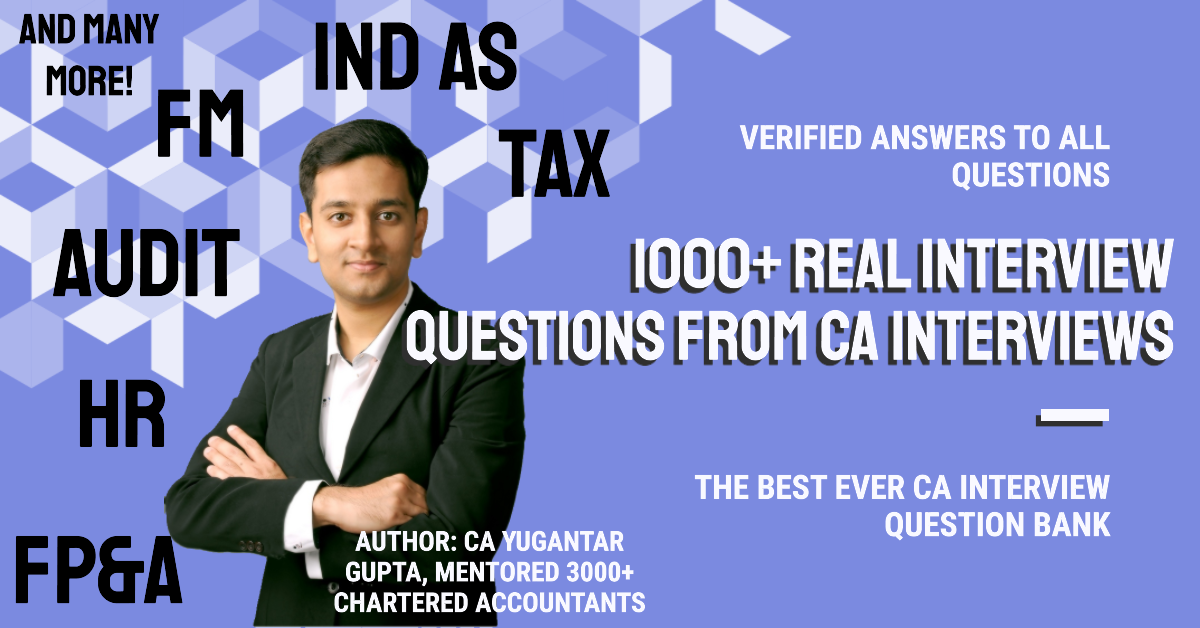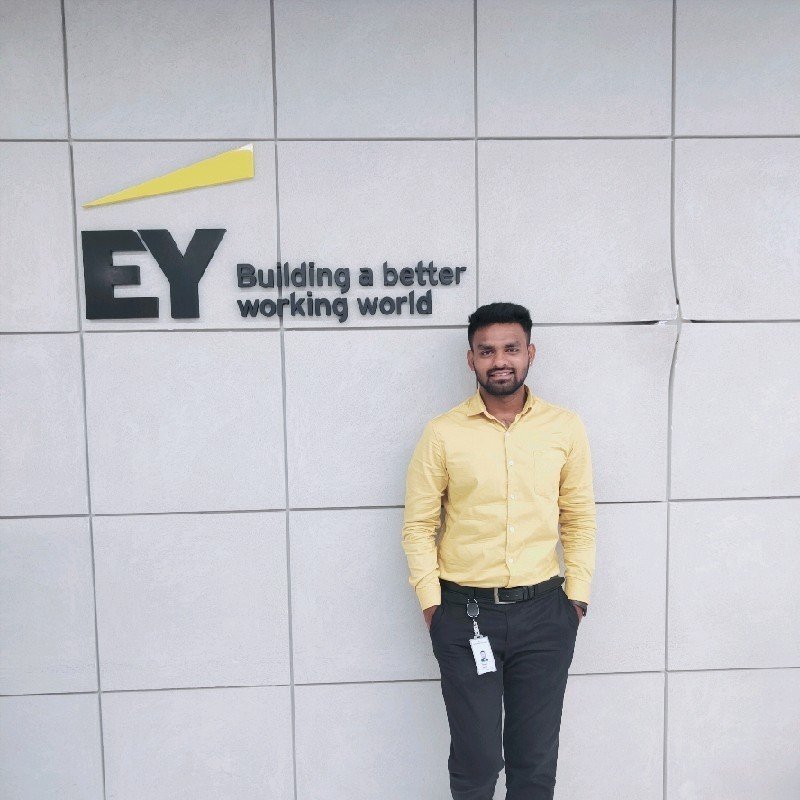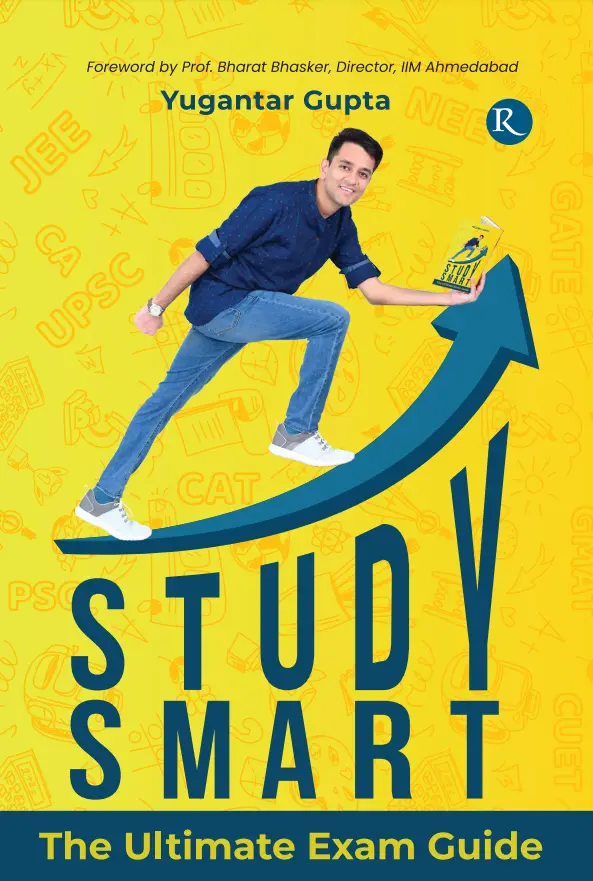
Click on add to cart to create your account/login. After that, click on add to cart again to complete the purchase
For queries email us at support@thecorporateinstitute.com or Whatsapp at 8297345238
Use code OFF25 for 25% off. Get 100% refund if you don’t like the question bank
What's Included
- Thirteen Comprehensive CA Interview Question Banks in secure PDF format
- All Recordings (i.e. 20+ Sessions) of CA Placement Preparation Programme
- Unlimited Personal Doubt Solving by CA Yugantar Gupta
- List of Referrers at companies
- Templates for Excel, Word, Power BI, Infographics, Business Agreements
- Exclusive Whatsapp Groups for peer-to-peer Interview Practice
To use the question bank after purchase, please go to the “Question Bank” button at the top. Alternatively you may visit https://thecorporateinstitute.com/question-bank-pdf
You need to be logged in to view it
About the Question Bank
If you needed past questions for exams, you could get them in ICAI Suggested Answers, but what about Interview Questions? We asked 1000+ CAs on their real interviews to compile the TCI CA Question Bank. 7 CAs have worked on drafting and compiling their answers. Even if you study the entire CA Final Syllabus you may not be able to answer all interview questions. Because there are often concepts asked that go beyond CA Final. This Question Bank will help you answer them. You can see our sample questions and answers below
What all you will get
- Statutory Audit Questions asked at Big 4s
- Internal Audit Questions asked at Big 4 and Industry
- Corporate Finance Questions asked at ITC, Nestle, Wipro etc
- Ind AS questions asked at Industry and Big 4s
- Real Group Discussion Topics from Vedanta, Flipkart, IOCL etc.
- HR Round Questions asked at all companies
- Income Tax Questions asked in Big 4 and Industry
- GST Questions in Big 4 and Industry
- Banking Industry Questions asked in HDFC, ICICI, Axis etc.
- Investment Banking Questions asked in JP Morgan, Goldman Sachs, Morgan Stanley





Course Curriculum
Last Day Revision – For Quick Technical Revision of All Concepts
-
Technical Interviews Rapid Fire Part 1
03:07:06 -
Technical Interviews Rapid Fire Part 2
02:46:38
CA Placement Preparation Programme
-
Full Presentation with all details
00:00 -
How to fill ICAI Campus Form
01:56:32 -
CV Preparation
02:23:58 -
Roles for CAs | Aptitude Tests
02:09:51 -
Group Discussions
02:10:24 -
Wipro
01:00:22 -
Technical Round overview
02:27:40 -
HR Round
02:32:41 -
Data Analytics for Audit
01:03:36 -
Getting into Statutory Audit
01:17:37 -
Off Campus | Financial Due Diligence
02:05:36 -
How to get into Accenture
01:05:04 -
Choosing 4 companies in Campus
01:21:28 -
Group Discussions | IOCL guidance
02:15:52 -
Big 4 Global PWC SDC Revision
02:21:22
How to Access the Question Bank
https://thecorporateinstitute.com/question-bank/
Go to the above link - select the area you want to study.
Alternatively, select the area from the menu dropdown
If you're facing issues in navigation contact support@thecorporateinstitute.com
You need to be logged in from the same ID from which you have purchased the question bank
-
How to access question bank
00:00
Important Information
-
Important Details
00:00
Some Sample Questions and Answers
Try answering them yourself before looking at the answer!
What is risk free rate? How will you calculate it for Afghanistan?
(This question was asked at ITC, Nestle, Wipro, Marico and many others. The example of a country differed – some asked it for Sri Lanka, some asked it for Ukraine. In all cases, the interviewer expected you to answer how to calculate the Risk Free Rate of a country in crisis)
In theory, the risk-free rate is the minimum return an investor expects for “delaying his consumption”. The investor will not accept any additional risk unless the potential rate of return is greater than the risk-free rate. Usually the government bond rate is used as the Risk free Rate. This raises several questions – which government, and what tenure? What if the government defaults? For instance, Greece has defaulted on its debt in the past.
To solve these, we need to follow a few rules
1. You can only use a developed country government bond rate that has a very strong economy and virtually no risk of default. This leaves us with very few options – US, UK, Germany, Japan etc.
Usually the US Government 10 Year Treasury Bond Rate should be used for most calculations. This is true even if the company is from India. Because from the perspective of a global investor, Indian Government bonds are not risk free.
2. You will choose the lowest available rate. The Italian Government Bond rate is higher than German Government Bond Rate since Italy is a weaker economy. So, even for an Italian Company, you will use the German Bond rate, even though both are denominated in Euros.
3. You will convert the risk free rate to the reporting currency. An Indian Company will be reporting in INR. So you can’t directly use the US Treasury Risk free rate. You need to adjust it for relative inflation in India vs US. The formula would be – Rf (INR) = Rf (USD) x Inflation (India)/ Inflation (US)
Airline Revenue Recognition (Real Interview Question of a software company)
A passenger books her flight ticket on 1st February and pays 10% of the ticket amount. She makes the remaining payment on 5th February. The ticket is fully refundable till 15th February after which it is fully non-refundable. The flight departs at 11 pm on 28th February and arrives at 2 am on 1st March. When should the airline recognise revenue?
Slightly positive NPV (Real Interview Question of an FMCG company)
The outlay for a factory is ₹100 Crores. On calculating the Present Value of inflows I get ₹100.1 Crores (i.e. NPV is ₹10 Lakhs? Should I accept the project? What if the NPV was ₹1 Lakh? What if it was ₹1 Crores? Will you spend ₹100 Crores just to get a benefit of ₹10 Lakhs?
Inventory of Steel (Real Interview Question of a conglomerate group)
A steel manufacturer uses steel blocks to manufacture steel sheets and sells it to a car manufacturer. The price of steel has dropped by 50%. How should the steel manufacturer deal with their existing raw material? Would your answer change if you were the car manufacturer?

